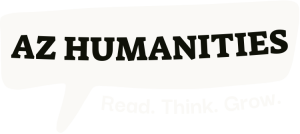Arizona Humanities is pleased to award $44,400 in spring Project Grant Awards! These incredible projects tell meaningful stories about Arizona and bring communities together to explore important cultural and historical themes.
Read more about each project below.
Amerind Foundation, Inc. – Dragoon, AZ
Transnational Deep History: Human Connections and Archaeology in the Ancient Borderlands of Arizona
Total Project Grant Award: $10,000
Project Director: Eric J. Kaldahl, 520-586-3666 / ekaldahl@amerind.org
Through a series of ten public programs and a new exhibition, the Transnational Deep History: Human Connections and Archaeology in the Ancient Borderlands of Arizona and Northern Mexico project allows participants to explore the ancient cultural heritage of Chihuahua, Arizona, and New Mexico. The Transnational Deep History project will generate a new bilingual (English/Spanish) exhibit at the Amerind Museum and speaker series held in Dragoon, Benson, Douglas, Sierra Vista, Tucson, and Willcox, Arizona. Both formats explore the Indigenous cultures that flourished between 600 and 800 years ago in the modern day states of Chihuahua, Arizona, and New Mexico, allowing the opportunity to learn about the ancient Indigenous people who called this region home.
Boderlands Theater – Tucson, AZ
Barrio Stories Project: Barrio Anita
Total Project Grant Award: $10,000
Project Director: Marc David Pinate, 520-882-8607 / marc@borderlandstheater.org
Building off the success of the first Barrio Stories Project last March, the Borderlands Theater’s Barrio Stories Project: Barrio Anita creates an immersive walking tour experience showcasing the history, heritage, and architecture of Tucson’s Barrio Anita, shaped by research collected from historical archives, oral histories, expert consultations and community meetings with current and past Barrio Anita residents. This project will result in large informational kiosks, exhibition displays, and multi-media video projected on the walls of historic buildings. Audiences encounter these unique displays on their tour along with original spoken word performances, shadow puppetry, tour guides, and historical reenactments.
Jewish History Museum / Holocaust History Center – Tucson, AZ
MyLife Archive: Tucson
Total Project Grant Award: $4,400
Project Director: Yanara Friedland, 520-670-9073 / programs@jewishhistorymuseum.org
The MyLife project from the Jewish History Museum serves as both a living archive and historical resource to shed light on the daily realities and impact of larger cultural and geo-political changes in the region on individual lives. MyLife is looking to address populations affected by historical themes such as removal, cultural assimilation, and relocation in a direct, person-to-person manner, particularly Holocaust survivors and newly arrived refugees from the Middle East. Through this project, the Jewish History Museum hopes to identify shared experiences between multiple communities and to invite interested participants to record their life story and co-create a MyLife biographical document to be highlighted in a community conversations series.
Museum of Northern Arizona Center – Flagstaff, AZ
Heritage Insights Series: Zuni, Hopi & Navajo Festivals
Total Project Grant Award: $5,000
Project Director: Anne Franke, 928-774-5211 / development@musnaz.org
The Museum of Northern Arizona (MNA) Heritage Insights series at the 27th Annual Zuni, 84th Annual Hopi, and 68th Annual Navajo Festivals of Arts & Culture strengthens MNA’s institutional initiative of celebrating the cultural diversity of the Colorado Plateau by promoting cross-cultural understanding and increasing appreciation of the artistry, history, and cultural heritage of the Zuni, Hopi, and Navajo tribes. At each festival, the Heritage Insights program is complimented by live musical and dance performances; a vibrant artists market that includes demonstrations from both traditional and contemporary indigenous artists and presentations by tribal experts, scholars, educators, and elders allowing attendees to learn directly from source communities.
Old Pueblo Archaeology Center– Tucson, AZ
Who Are The Sobaipuri O’odham?
Total Project Grant Award: $5,000
Project Director: Dr. Deni Seymour, 505-934-3364 / djslmas@aol.com
Through the creation of a video, interactive lectures and discussions, the Old Pueblo Archaeology Center strives to promote understanding of the human experience through the eyes of the Wa:k O’odham and their ancestors. Using discussions and interviews with Wa:k O’odham community members, the video and subsequent discussions will highlight the issues of how public policy, politics, and economic interest have influenced our understanding of the Wa:k O’odham and how their heritage has been shaped and in some cases erased.
Southwest Folklife Alliance– Tucson, AZ
Taste Bud Memories
Total Project Grant Award: $5,000
Project Director: Leia Maahs, 520-621-4046 / leiamaahs@email.arizona.edu
Taste Bud Memories is a series of public engagement activities, short digital stories and a documentary film focusing on local food and refugees in Tucson, AZ. The project aims to promote understanding of refugees’ experiences by connecting food resources, local geography and the public at large in a broader discourse about food and food security through people’s individual stories about food. Public programs include harvests, potlucks, cooking demonstrations, film screenings, scholar’s panel, and story circle salons; the end products of Taste Bud Memories will be a series of digital stories, a documentary film and an online cook book.
Tucson Botanical Gardens– Tucson, AZ
Food Traditions and Favorite Recipes from Tucson’s Mexican-Americans
Total Project Grant Award: $5,000
Project Director: Dr. Juliet Niehaus, 520-326-9686 / horttherapy@tucsonbotanical.org
Tucson Botanical Gardens (TBG) partners with the Catholic Social Services (CSS) senior nutrition programs to gather favorite recipes from Mexican-American seniors at El Pueblo Senior Center and the community at large. These are to be shared with the community through events hosted by TBG and CSS in September 2018, at which contributors will convey their unique ethnic and family stories through their recipes and discussion of newly emergent Tucson traditions of Mexican cuisine, resulting in the creation of a bilingual booklet of recipes. The project strives to contribute to the building of a diverse local community by bringing Mexican seniors and the community at large together to celebrate the ethnic traditions of the growing Tucson community.
